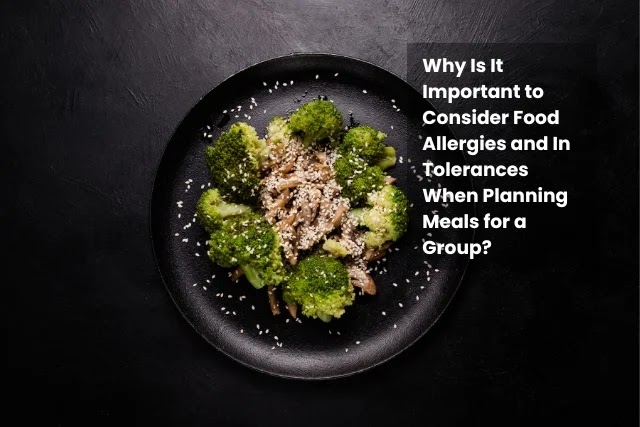Introduction:
In a world where culinary diversity is celebrated and dietary preferences vary widely, accommodating food allergies and intolerances is paramount when planning meals for a group. The significance of addressing these dietary restrictions extends far beyond mere courtesy; it involves the well-being and satisfaction of individuals within your group. Food allergies can trigger severe, even life-threatening reactions, while intolerances can lead to discomfort and digestive issues. Neglecting to consider these factors not only puts the health of participants at risk but also affects their overall experience.
From a practical perspective, thoughtful meal planning that accounts for allergies and intolerances fosters inclusivity and harmony, ensuring that everyone can partake in the communal enjoyment of food without concern. In this article, we will explore the compelling reasons why taking these dietary considerations into account is essential when catering to a diverse group’s needs.
Furthermore, mindful meal planning ensures that everyone at the table can fully enjoy and partake in the shared experience of dining, fostering a sense of belonging and creating memorable moments for all. In this article, we will delve into the reasons why it’s crucial to make food allergies and intolerances a top priority when preparing meals for a diverse group.
- Health and safety implications
- Inclusivity and diverse dietary needs
- Legal and ethical responsibilities
- Avoiding cross-contamination risks
- Enhancing the dining experience
- Planning for special dietary requirements
Health and Safety Implications:
When planning meals for a group, it’s essential to consider food allergies and intolerances due to the critical health and safety implications involved. Allergies can trigger severe and even life-threatening reactions, such as anaphylaxis, which can result in difficulty breathing, a drop in blood pressure, and loss of consciousness. For individuals with intolerances, consuming problematic foods can lead to discomfort, digestive issues, and in some cases, long-term health problems. Neglecting these concerns can lead to serious health risks for your guests, making it imperative to prioritize their well-being.
Additionally, addressing food allergies and intolerances promotes a safer dining environment. It helps avoid accidental ingestion of allergens or irritants, which could potentially lead to an emergency situation. By being vigilant in meal planning and preparation, you reduce the risk of exposing individuals to allergens, creating a safer and more secure environment for everyone. Considering these health and safety implications is not just a matter of courtesy; it’s a fundamental responsibility when planning group meals.
Inclusivity and Diverse Dietary Needs:
Another compelling reason to consider food allergies and intolerances when planning group meals is to ensure inclusivity and cater to diverse dietary needs. People have varying food preferences and restrictions, which may be based on cultural, religious, health, or personal reasons. Ignoring these considerations can result in some individuals feeling excluded or uncomfortable during meal gatherings. In contrast, making an effort to accommodate these diverse dietary needs demonstrates respect for your guests’ backgrounds and beliefs.
Creating inclusive meal options can also foster a sense of belonging and unity. When everyone can enjoy the meal without concerns about their dietary restrictions, it promotes a more harmonious and enjoyable dining experience. This inclusivity not only benefits those with allergies or intolerances but also enhances the overall atmosphere of the meal, ensuring that everyone feels valued and welcomed.
Legal and Ethical Responsibilities:
Food allergies and intolerances aren’t just a matter of courtesy but also a legal and ethical responsibility when planning group meals. In many regions, laws and regulations exist that require food establishments and event organizers to provide information about allergenic ingredients in their offerings. Failing to comply with these regulations can result in legal consequences, including fines and legal actions.
Beyond the legal aspect, there’s also an ethical dimension to consider. Respecting the dietary requirements of your guests demonstrates a commitment to their well-being and happiness. It reflects positively on your organization, reinforcing your reputation for caring and responsible event planning. Meeting legal and ethical obligations is not merely a formality; it is a reflection of your commitment to providing a safe and welcoming dining experience for all.
Avoiding Cross-Contamination Risks:
Cross-contamination is a significant concern when preparing meals for a group with varying dietary needs. Even small traces of allergenic ingredients can pose a threat to individuals with allergies, as well as those with intolerances. To prevent cross-contamination, special care must be taken during meal preparation, storage, and serving. Separate utensils, surfaces, and cooking equipment may be required to ensure the safety of the meal.
Ignoring these precautions can lead to unintentional exposure to allergens, causing harm to those with food allergies or intolerances. Avoiding cross-contamination risks is an integral part of ensuring the safety of your guests. It’s crucial to recognize that food allergies and intolerances are not always visible, making it even more essential to take these precautions seriously. By doing so, you provide peace of mind to those with dietary restrictions and promote a safer dining experience for all.
Enhancing the Dining Experience:
Considering food allergies and intolerances in meal planning isn’t just about avoiding potential pitfalls; it’s also about enhancing the overall dining experience. When you offer a menu that caters to diverse dietary needs, it fosters a more enjoyable atmosphere. Guests can relax and savor their meals without anxiety, leading to a more positive and memorable dining experience.
Additionally, offering thoughtfully planned alternatives and options can elevate the quality of the meal itself. Dishes designed to accommodate allergies and intolerances can be just as delicious and satisfying as their traditional counterparts. This approach encourages creativity in meal preparation and allows your group to explore new flavors and culinary experiences, making the dining event more memorable and enjoyable for everyone.
Planning for Special Dietary Requirements:
In the process of planning group meals, it is imperative to take into account the special dietary requirements of your guests, including food allergies and intolerances. To ensure everyone’s needs are met, you must be proactive in communicating with attendees and collecting information about their dietary restrictions in advance.
Adequate planning for special dietary requirements involves collaborating with guests to understand their needs and preferences. This allows you to create a tailored menu that accommodates their restrictions while still offering delicious and satisfying options. It’s essential to keep a record of these preferences, train the kitchen staff on safe food handling practices, and have clear labels for allergenic ingredients during the meal presentation. Effective planning for special dietary requirements guarantees a smooth and enjoyable dining experience for all attendees, reinforcing your commitment to their well-being and satisfaction.
Conclusion:
I hope this exploration of the importance of considering food allergies and intolerances when planning meals for a group has underscored the critical significance of this practice. As we conclude, it is evident that prioritizing these dietary concerns is not just a courtesy; it’s a fundamental responsibility for anyone involved in meal planning or event organization.
By addressing the health and safety implications, inclusivity, legal and ethical responsibilities, cross-contamination risks, and the potential to enhance the dining experience, we acknowledge the diverse needs and preferences of our guests. Through proactive planning for special dietary requirements, we create an environment where everyone can share in the joy of communal dining without anxiety or discomfort.
In doing so, we not only ensure the well-being of our guests but also promote unity, respect, and a memorable dining experience. Ultimately, embracing food allergies and intolerances in meal planning reflects a commitment to the health and happiness of all, reinforcing the notion that good food is meant to be enjoyed by everyone, regardless of their dietary restrictions.

